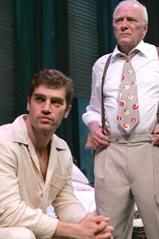SEARCH CurtainUp
REVIEWS
FEATURES
NEWS
Etcetera and
Short Term Listings
LISTINGS
Broadway
Off-Broadway
BOOKS and CDs
OTHER PLACES
Berkshires
London
LA/San Diego
Philadelphia
Elsewhere
QUOTES
On TKTS
LETTERS TO EDITOR
FILM
LINKS
MISCELLANEOUS
Free Updates
Masthead
NYC Weather
 Review
Review
Cat on a Hot Tin Roof
by Dolores W. Gregory

Jeremy Davidson as an aptly "hunky" Brick and George Grizzard as Big Daddy
(Photo: Joan Marcus )
|
For the better part of an hour, Grizzard owns the stage as a self-made man whose lifelong accomplishments seem trivial in the face of cancer. But having received a stay of execution---the doctor has declared his stomach ailment a mere bout of "spastic colon"--- Big Daddy has decided to live like never before. He has no more patience for the niceties of life---such as being polite to his annoying wife (Dana Ivey) or concealing his contempt for his spineless elder son (T. Scott Cunningham)---and Big Daddy is determined to get to the bottom of a brewing family crisis: the apparent inability of his cherished younger son, Brick (Jeremy Davidson), to father a child with Maggie.
The entire story plays out in Maggie and Brick's bedroom, where, for some time now, the couple have been sleeping in separate beds. This secret, however, is no secret at all. Brick's mother, Big Mama, has installed his older brother, Gooper, and Gooper's wife, Mae (Emily Skinner), in the room next door, where they have been eavesdropping on the ongoing battle. The pregnant Mae, swelled to bursting with her sixth child, is thrilled to impart the sordid details to her mother-in-law, for despite the doctor's optimistic diagnosis of Big Daddy, Mae and Gooper are hoping to wrestle control of the family assets away from the heir apparent, Brick.
As in other works by Williams, themes of repressed homosexuality, Southern hypocrisy, and the bitter limitations of lives stymied by social convention surface here and are given a thorough going over in three acts of poetry and improbability. The language is sublime and the motivations obscure in a story that seems not to have worn all that well since its Broadway launch in 1950. But the "so what?" factor that surfaces early on in Act One might be more a function of the complete lack of chemistry between Masterson and Davidson, however, than of any shortcomings in the text.
Act One ought to be a sexually taut battle of wills between a frustrated, lonely wife and her terrified husband, a man who retreats to the bottle to swamp his feelings of sexual inadequacy. It is instead a rather flat exercise. Masterson is out of place in the steamy world of Williams' American South. Despite her Mississippi Delta drawl and her best efforts to sprawl sexily across the bed when the line warrants, virtually everything Maggie says seems to ring false. You simply don't believe that this is a woman whose husband has rejected her because he blames her for the death of his friend and, it is implied, would-be lover.
For a lesson in how to inhabit a character thoroughly, Masterson might study Grizzard's performance in the second act. Grizzard is an actor frequently cast as thinkers and intellectuals---he has a recurring role as a crafty attorney on Law & Order---but he wears his earthy swagger with complete ease. There is nothing false about this man: Big Daddy is a man who has worked his way up, literally, through back-breaking labor, and if he cannot understand hesitation or introspection, it is only because he has no practical use for such luxuries. Yet---at a time when he desperately needs to connect with his son--- words fail him. He talks in circles, repeating himself without knowing it, revealing the raw nerve of fear that lies beneath his bluster. In his flailing efforts to achieve some kind of understanding with the son who confounds him, Grizzard shows us the pathos that sparks his brutality. In Big Daddy, Williams exposes the fundamental paradox of family life---- the emotional need for love and approval that drives one equally to resentment and contempt.
|
Cat on a Hot Tin Roof by Tennessee Williams Directed by Mark Lamos With Mary Stuart Masterson, Jeremy Davidson, Emily Skinner, Dana Ivey, Aakhu TuahNera Freeman, Nathan Pratt, Lexi Haddad, N. Justin Hancock, Erin Elizabeth Wall, Caitlin Redding, George Grizzard, T. Scott Cunningham, Harry A. Winter, Brian Reddy, Jeorge Watson Scenic Design by John Lee Beatty Costumes by Jane Greenwood Lighting by Howell Binkley Sound by John Gromada Fight Choreography by Brad Waller The John F. Kennedy Center for the Performing Arts Telephone (202)-467-4600 or (800) 444-1324 Opened June 12, 2004, closes July 4, 2004. Reviewed by Dolores W. Gregory June 19 based on a June 17 performance. |

Retold by Tina Packer of Shakespeare & Co.
Click image to buy.

Mendes at the Donmar
Our Review

At This Theater

Leonard Maltin's 2003 Movie and Video Guide

Ridiculous!The Theatrical Life & Times of Charles Ludlam

6, 500 Comparative Phrases including 800 Shakespearean Metaphors by CurtainUp's editor.
Click image to buy.
Go here for details and larger image.



